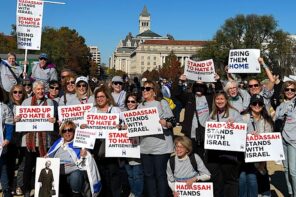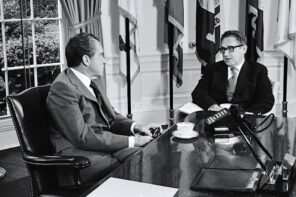Outside the Jewish community, I suppose the Anti-Defamation League (ADL) looks like one of our most respected and venerable institutions. Issuing press statements, soliciting apologies from anti-Semites, patrolling our world for outbursts of hatred against Jews (and, occasionally others), the ADL is ubiquitous, powerful, rich, and noble.
So there was a fair amount of surprise when ADL went on record opposing the construction of a progressive, moderate, multifaith dialogue-oriented Islamic center two blocks from Ground Zero in Manhattan. Wait a minute, my (non-Jewish) boyfriend asked me, did they drop a letter from their name? Are they the Defamation League now?
A Wounded People
Those of us who have watched the ADL for years were less surprised. The sad truth is, while there is an interesting backstory which explains some of this bizarre situation, the ADL has long been out of step with more progressive elements of the Jewish community. It’s a cross between a sacred cow and a dinosaur: an old, venerable organization, with values that (at least to this progressive, post-denominational Jew) have long seemed, well, a little too old and venerable.
The core of the issue is, I think, how we understand the lessons of—here comes the H-word—the Holocaust. Is the core lesson that “hatred and bigotry are wrong,” or that “hatred of Jews is wrong”? The ADL generally tries to have it both ways. On the one hand, they give more than lip service to combating bigotry where they find it: they have serious programs on civil rights and immigration, among other issues. On the other hand, by mission and by donor composition, they are focused on Jewish issues specifically. Their director, Abraham Foxman, is always the point man when a Mel Gibson or Helen Thomas says something anti-Semitic. The ADL may be about combating defamation, but it’s mostly about combating anti-Jewish defamation.
This leads to a certain contradiction. On the one hand, the Holocaust teaches we must see one another as brothers and sisters. On the other, many in the Jewish community are doing the opposite: using their political and financial muscle to fight for the Jews against their enemies. Worse, in so doing, we replay our own national trauma, over and over again. My colleague J.J. Goldberg recently related a story told to him by former Israeli UN ambassador Abba Eban. Explaining Israel’s conduct in 1970, Eban said “you must understand, we’re a wounded people.” To which a British friend replied, “yes, but you’re a wounded people with an atom bomb.”
Who is Defamed, and Who the Defamer?
So too today. As Goldberg went onto describe, many powerful American Jews are on a perpetual, wound-driven witch hunt against anti-Semitism; and many use the ADL as a pawn. For example, when filmmaker Oliver Stone made some ill-considered remarks recently, the ADL extracted not one but two apologies from him. But that didn’t stop two Jewish media moguls from trying to get his Showtime series canceled (by another Jewish media mogul, no less). The irony was inescapable: Stone had impugned Jewish media power, and to condemn him for his anti-Semitism, Jewish media power tried to shut him down.
The ADL’s conduct with regard to the “Ground Zero mosque” must be understood within this context, and within the posture of the ADL as Defender of the Jews first and foremost.
For the ADL, what the “Ground Zero mosque” is really about is a certain kind of payback. In an interview with the Forward, the largest Jewish newspaper in the United States, Foxman explained that, to him, this controversy was like the one in the late 1980s over a Carmelite convent at Auschwitz. Then, Foxman said, “we asked the world to understand our pain, our sensitivity.” And now? “I felt and we felt that here is another group who is in the same position.”
Of course, there are at least two huge holes in the syllogism here. The first is that the “other group” in this case—the families of 9/11 victims—is divided amongst itself. Some are in favor of the center, others are opposed. There’s certainly no consensus. Whereas almost no Jews wanted a convent at a death camp.
But more importantly, are these “sensitivities” even analogous? Is the unreflective, knee-jerk Islamophobia of a few families (and the posturing of cynical politicians) really the same as the feelings of Holocaust survivors and their families not wanting a cross towering over Auschwitz? Are all wounded feelings really equal?
Muslims in the U.S. are the victims of defamation, not the perpetrators of it. They’re not like Catholics in Poland—they’re like Jews in Poland. As such, the “sensitivities” of some families are like the sensitivities of white people not wanting blacks to move into their neighborhood. Of course, such sentiments are interwoven with very real grief and trauma, and I do not presume to judge anyone who lost a loved one on September 11. But the moderate Muslims of the “Ground Zero mosque” are not the perpetrators of 9/11; in a very real sense, they, too, are victims of it.
How could Foxman not see this? How could he, after decades of advocacy, be so tone deaf to the realities of who is the Defamed and who is the Defamer?
Off the Deep End
We’ll never know for sure, but I think there are several reasons. First is history; Foxman saw another group complaining about a religious shrine near a place of mass trauma, and he saw himself. As he was right, so they are right, end of story. Second is a blindness about Muslims being victims. The ADL exposes real, vicious anti-Semitism in the Arab world all the time; just check their Web site. They are used to the Muslims being the bad guys, and many of their very conservative donors drink from the well of the American Right’s Islamophobia—the new anti-communism, as some pundits have observed.
Of course, the best weapon against radical Islamism is the moderate Islam preached by Imam Faisal Rauf, who has a long record of interfaith dialogue with the American Jewish community. Indeed, as almost every mainstream Jewish organization has recognized, there’s no better place than downtown Manhattan for such a strong protest against extremism. Al Qaeda does not stand for Islam, this center says—and intolerance does not stand for America.
But that subtlety is lost in the broad brush of Fox News’ yellow journalism, conservatives’ irrational Islamophobia, and, I submit, the long history of us-versus-them thinking that affects how the ADL does business. The ADL has, in its bones, centuries of Jewish woundedness; it’s part of its board, its mission, its way of being in the world. For years now, it has acted like the wounded boy with the atom bomb, arm-twisting the powerful to say ‘uncle,’ and gaining money, clout, and moral high-ground with the sonorous pieties of “Never Again.” And now it has jumped the shark: it’s gone over the line, perhaps off the deep end.
Well, not really. The ADL will survive; in the Jewish world, it’s too big to fail. But for many Jews, including many younger ones, their recent stance on the “mosque” has shifted things. Now we all should know: Al Qaeda doesn’t speak for all Muslims, bigots don’t speak for all Americans—and the ADL doesn’t speak for all Jews.




